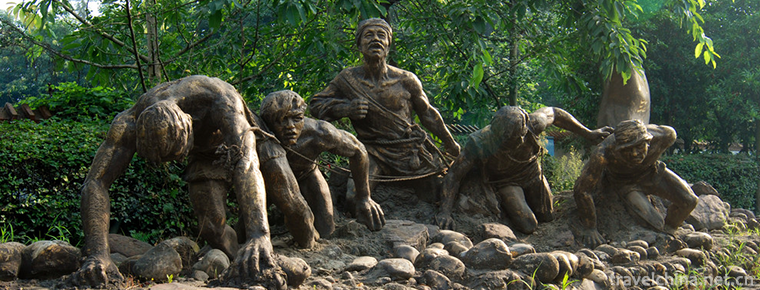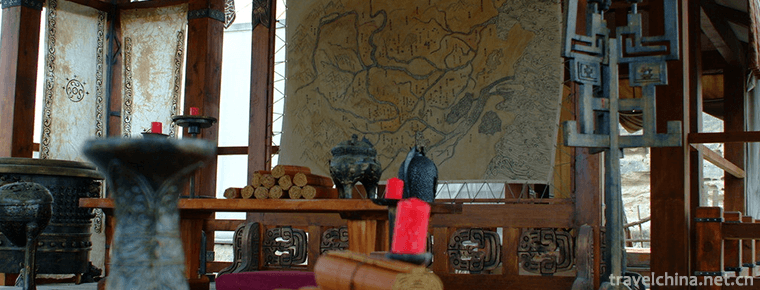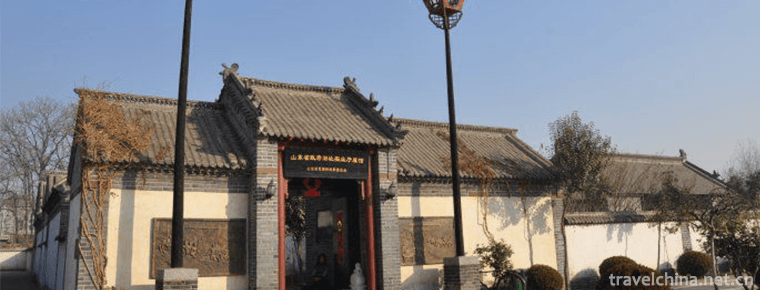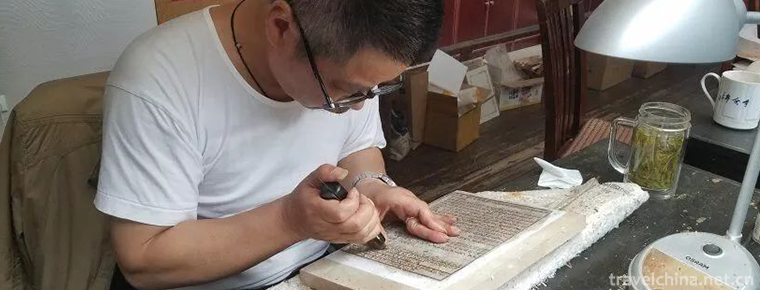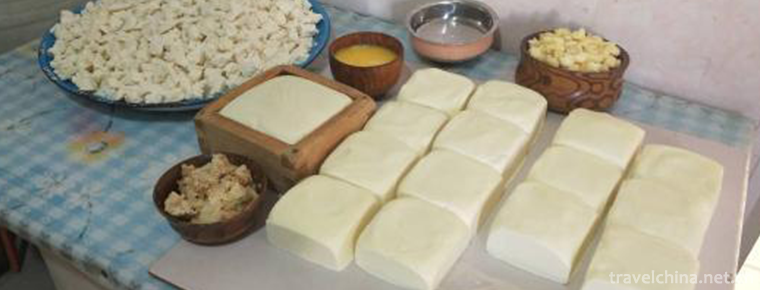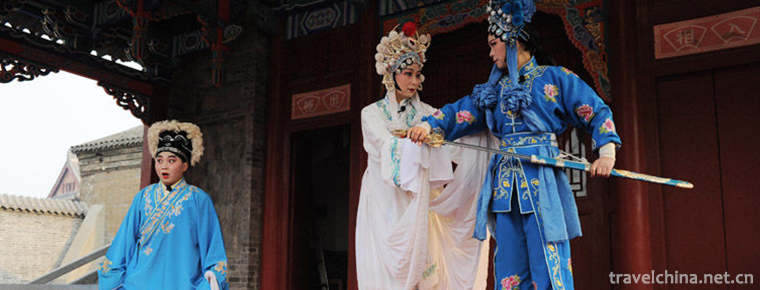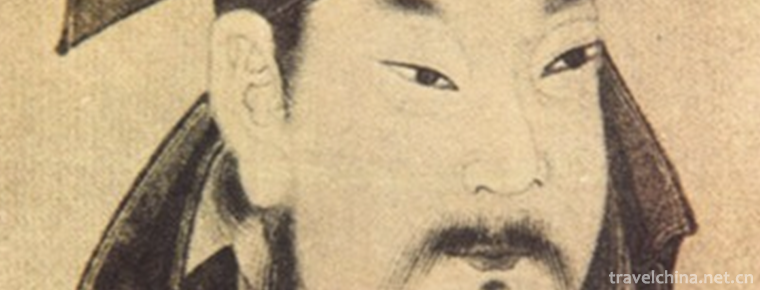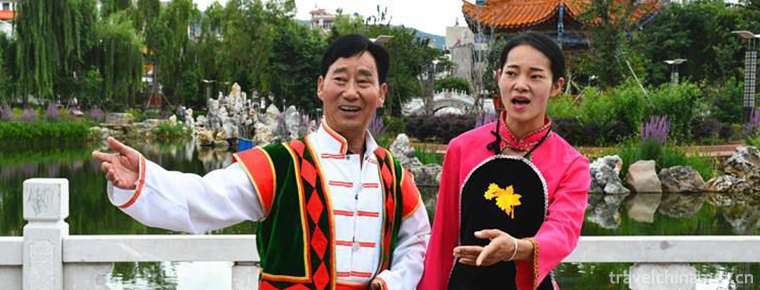Ping Zhou He Zhou
Ping Zhou He Zhou
Hezhou Pingxian was known as Pingdiao and Rhythm in ancient times, and it was also called Linxia Pingxian after 1949. Its main musical instrument is three strings. It is an ancient traditional folk opera. Mainly spread in Linxia City, Linxia County, Jishishan County, Hezheng County, Yongjing County, Gansu Province, is a common kind of singing songs for wedding, birthday, holiday, parks and tea gardens. Compared with Hezhou Xianxiao, Pingxian is "silk and satin" and "fine work", which is popular in their respective circles. Hezhou Pingxian is the third batch of national intangible cultural heritage list projects and the second batch of Gansu intangible cultural heritage list projects.
historical origin
Hezhou Pingxian did not know when it originated or when it was introduced into Linxia. At least in the late 19th century (late Qing Dynasty), it was popular among Linxia people. Hezhou Pingxian has a long history. Its name is similar to Tang and Song Zaqu, Yuan and Ming Sanqu and popular songs. It not only retains some of the rhymes of Xiliangyue, but also echoes many tones of Southern and Southern Xiaoqu. Some studies have shown that the origins of Pingxian Ci are quite complex. It can be inferred to the Tang and Five Dynasties Bianwen, Jin and Yuan Dynasties Zhugong Diao, down to the Ming and Qing Dynasties Baojuan Ci, and absorbed more local folk tunes, forming a unique Hezhou Pingxian. Therefore, in the eyes of flat string artists, flat string is regarded as "fine goods" and Xianxiao as "coarse goods". According to artists'legends, Hezhou Pingxian was first sung in the Imperial Palace and was once loved by the emperor. In his article The Art of Hezhou Rap and Singing, Mr. Wang Pei believes that the legend has some truth from the characteristics of Hezhou Pingxian's beautiful lyrics, melodious tunes and elegant singing forms.
Art inheritance
From the early to the middle of the 20th century, Hezhou Pingxian was once popular in Linxia area. Mr. Luo Liangde opened "Hezhou Pingxian Self-Music Tea Garden" in Hezhou City, Mr. Li Yuhe's "Garden Street Self-Music Tea Garden" and Mr. Geng Zhitian's "Fenglin Tea Garden" to sing "Pingxian" for a while. Recorded artists include Fei Baojia (Daoguang), Tang Jianghu (Guangxu), Luo Liangde, Li Yuhe, Kui Shirong, Ma Jiuwa (Hui), Geng Zhitian, Li Sun-sheng, Shi Yuqing, Gao Zhengwei, Qi Jing'an, Bu Haizhou, Shi Dean, Tang Haian, Feng Jin, Zhao Sen, Puzhen, Zhu Binru, Li Yongzi, Lei Ping and so on. There are nearly a hundred traditional singing books with their main contents. If there are excellent chapters or fragments in famous historical works, myths and legends, folk stories and Yuan and Ming Zaju. Confucius worshiped his master, fishing and woodcutting, Boya Fuqin, Suwu Shepherd, Emperor's Aunt Becoming a Family, Zhenwu Chengsheng, Dove Father Advising Friends, Wu Zixu Crossing the River, Zhaojun and Fan, Returning the Sun to Yourself, Liquor and Wealth Biography, Bird Ming Injustice and Eleven Heads are the major books. The small books include "Yang Happy", "Song Jiang Toupeng", "White Ape Pirates Peach", "Ying Ying Xing", "Shili Pavilion" and so on. There are also "play moonlight", "sigh ten voices", "family happiness", "ten not close" and other "small" or "small dots". Up to now, there are only dozens of traditional albums left.
Achievement honor
In 1953, Geng Zhitian, a famous artist of Pingxian, went to Beijing to perform "The First Meeting of the Western Chamber" in the "National Folk Literature and Art Festival" held in Beijing. In 1957, Pingxian was well received in the "Gansu Puppet Shadow Opera and Music Festival" held in Lanzhou. In the 1960s, Ding Shaotang, a literary and artistic worker, compiled "Daxia River Beiyuan" and Lu Tuo recorded part of Pingxian Ci and Song. In the Cultural Revolution, cultural stations and clubs were banned, and artists were destroyed. After 1980, the "Story Club", compiled by Kang Shangyi and Hu Jixian of the State Cultural Workers'Group, brought Hezhou Pingxian to the stage in the form of female voice singing and participated in the provincial performance, which enlarged its influence and made the ancient music sound.
Inheritor
Linxia Pingxian artists have masters in their generation. According to Wang Pei's "Hezhou Rap and Singing Art", Tang Wanshou (1871-1944), Geng Zhitian (1903-1978), Li Sun-sheng (1899-1959), Zhao Sen (1937-1993), Puzhen (1926-1955) and other well-known Pingxian artists have traveled all over Gansu, Qingning and other provinces. With their joint efforts, Hezhou Pingxian once caused a sensation in the literary and artistic circles. Hezhou Pingxianjie has left a very valuable audio material. However, at the beginning of the 21st century, Hezhou Pingxian left only one veteran artist, Li Yongzi.
Li Yongzi, male, was born in 1933 in Hou Duan family of Beiguan, Linxia County. Its three strings are clear and loud, like pearls falling on a jade plate; the use of the gentle kneading, long kneading and strong kneading of the sub-strings makes the different emotions of the same card vividly; the repeated appearance of sweep chords and old strings makes the unique charm of flat strings exciting. In 1959, he participated in the "First Mass Literature and Art Festival in Gansu Province", accompanying the performances of Geng Zhitian and Li Sun-sheng. He also performed the program "Communist Party is better than mother and son", which won the excellent program award. In 1985, more than 50 recordings, music cards and arias were rescued, of which about 20 were included in the Chinese Music Integration of Quyi. Influenced by his grandfather Li Sun-sheng, Li Yongzi pulled from Yiping string to more than forty traditional pieces from "Red Sun Rising in the East". Since Li Sun-sheng's death, Li Yongzi has been a teacher of Geng Zhitian, gradually mastering more than 30 singing tunes such as "Qiancha", "Shuqiang", "Dazi" and "Beigong", and mastering the basic rules of the line of Ping string and the mode of harmony accompaniment. Li Yongzi's life singing of Hezhou Pingxian is mostly welcomed by historical masterpieces, myths and legends, divided into large, small, small or small. Big books include "Emperor's Aunt Married", "Zhenwu Chengsheng" and so on. The plot is rich and tortuous, and the characters are vivid and moving. Small books include "Song Jiang Tuoming", "Bai Ape Pirate Peach", "Baqiao Picking Robe", "Huarong Road", "Woodman Singing Four Seasons", "Shili Pavilion" and so on. The content is complete and the theme is clear; small paragraphs or small points such as "Playing with Moonlight", "Sighing Ten Voices" and "Whole Family". Fortune and Ten Kindnesses are simple, short and succinct, and widely spread. As the only heirloom of Hezhou Pingxian, Li Yongzi's son, Li Zhenguo, and daughter, Li Zhenlian, were influenced by him to practise Pingxian leisurely and play two pingxian. Hou Shangda, Hao Chenggong, Li Chunwen and other apprentices occasionally came to learn Pingxian. In the third generation of Li Yongzi's descendants, Li Yongzi was delighted by the talent and interest of his grandsons, Li Chaojie and Li Chaojun. In particular, Li Chaojie could play 80% of the lower string and 23% of the flat string.
Li Chunwen, male, born in 1981 in Linxia City, is the Hezhou Pingxian prefecture-level successor. Influenced by his parents, he began to learn folk art at the age of 12. He began to learn Erhu, Sanxian, Yangqin and other musical instruments at the age of 18. He began to learn Hezhou Xiaosheng and Xianxiao at the age of 19. He learned Hezhou Pingxian from the famous artist Mr. Li Yongzi. From 2000 to 2010, when Mr. Li Yongzi died, he devoted himself to three-string playing and singing. He mastered all the existing Hezhou Pingxian repertoires, such as White Ape Pirates Peaches, Lin Chong Running at Night, Yingying Travel, Emperor Aunt Becoming a Family, Zhenwu Chengsheng, and mastered the accompaniment of Pingxian. In his performance, he pays attention to the traditional charm of local art and enriches artistic expressiveness. He is the only artist in Linxia area who has mastered Hezhou Pingxian singing and accompaniment. On his deathbed, Li Yongzi's old artist not only passed on his precious image materials to Li Chunwen, but also placed the inheritance and development of Dahezhou Pingxian on him. For this reason, Li Chunwen, on the basis of his insistence on singing Hezhou Pingxian, also actively influenced and taught others, launched Hezhou Pingxian Quyi Concert in 2006, gathered a group of enthusiasts such as Xie Wanyou, Chang Zili, Wang Xiaolin, Li Zhenguo, and often carried out singing and biography activities. He created, adapted and transplanted Pingxian Huarong Road, Fisherman's Farming Reading, Qixing Lantern and so on. Efforts should be made to restore the glory of local art such as Pingxian, which has been lost for many years. As a result of Li Chunwen's achievements in the inheritance of Hezhou Pingxian, he was absorbed as a member by the Provincial Wenlian Quyi Artists Association, and participated in the Congress of members of Gansu Quyi Artists Association in 2010, which expanded the external influence of Hezhou Pingxian .
protective measures
In order to promote the protection and inheritance of Hezhou Pingxian, Li Chunwen, a disciple of Li Yongzi, took the lead in setting up Hezhou Quyi Concert in 2005 to carry out performance exchange activities by means of in-depth local cultural tea plantations, group performances and field exchanges. The younger generation of artists are also responsible for recording the plain strings they usually play and releasing the recordings to video portals such as Tudou and Youku, in order to expand the influence of Hezhou plain strings. However, the development of Hezhou Quyi Concert is not optimistic. Normally, less than ten people participate actively in the concert. The age of performers (singers) is basically over 40 years old, and the awareness of Hezhou Pingxian protection is not strong. In addition, the attraction of Hezhou Pingxian to young people has declined sharply. The soil of Hezhou Pingxian is gradually disappearing, and it has gradually become an art of rap and singing.
In 2010, Hezhou Pingxian was listed as a national intangible cultural heritage project. Linxia County has repeatedly cooperated with the staff of Linxia Cultural Policy Research Office and Cultural Museum to record and protect more than 50 works such as Li Yongzi's repertoire, tunes and arias. Among them, 20 works have also been selected as the title of Chinese Music Collection.

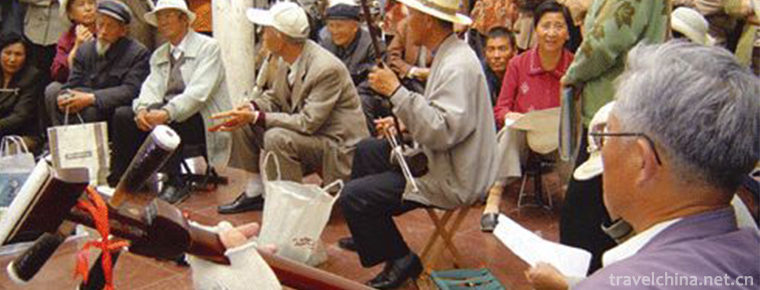
-
Karajun Scenic Area
Karajun is Kazakh, meaning "the wilderness on the ridge". Karajun Mountain is a stretch of mountains from east to west. On both sides of it are hills with ravines and combs.
Views: 156 Time 2018-12-12 -
Shennong Creek Scenic Area
Shennongxi, originating from the main peak of Shennongjia, flows through Badong County, Hubei Province. It travels from north to south through deep mountain canyons, and converges into the Yangtze Riv.
Views: 147 Time 2018-12-12 -
Kizil Gaha Peak Sui
Located on the east side of Saltwater Valley in the northwest of Kuqa County Town, Kizil Mahabi is a towering ancient military building with the meaning of "old red mouth" or "red sentr.
Views: 139 Time 2018-12-23 -
Niulang and Zhinu Scenic Spot
Niulang Zhinu Scenic Area is located in Yanya Town, southeast of Yiyuan County, Shandong Province, 15 kilometers away from the county town. The scenic area is mainly composed of Daxianshan Mountain.
Views: 387 Time 2019-02-07 -
The Old Site of Command of 115 Division of Shandong Province Government and Eighth Route Army
The former site of Shandong provincial government and 115 division headquarters of the Eighth Route Army is the headquarters of 115 division of the Eighth Route Army, Shandong Branch of the Communist .
Views: 123 Time 2019-02-08 -
Shui Dong gou
The Shuidonggou scenic spot in Ningxia is the earliest Paleolithic cultural site excavated in China. It is known as the birthplace of Chinese Prehistoric Archaeology.
Views: 145 Time 2019-02-08 -
Engraving Printing Skills
Engraving printing technology, Yangzhou City, Jiangsu Province, local traditional handicraft, one of the national intangible cultural heritage..
Views: 394 Time 2019-04-27 -
Dairy Products Production Techniques
Mongolian phonetic translation. Mongolian drinks. Also known as "white food", that is, dairy products. Milk, mare's milk, goat's milk, camel's milk, cream of milk skin, cheese, dried milk, s.
Views: 131 Time 2019-06-07 -
Violin Opera
Violin opera, originally a flower-drum opera in Yueyang, Hunan Province, spread to Chongyang, Tongcheng and other places around the end of the Qing Dynasty and renamed "Violin Opera", is a u.
Views: 167 Time 2019-06-19 -
Legend of Wang Xizhi
Wang Xizhi's legend is a local folklore in Shaoxing City, Zhejiang Province. Wang Xizhi has few words. Jin Dynasty, one of the most famous calligraphers in China, once served as a general of the Right.
Views: 203 Time 2019-06-26 -
Yao an Bazi Cavity
On June 7, 2008, Yao'an Baziqiang, declared by Yao'an County, Yunnan Province, was listed in the second batch of national intangible cultural heritage list with the approval of the State Council. Heri.
Views: 312 Time 2019-07-11 -
Neijiang science and technology
In 2019, Neijiang City completed 195 science and technology projects above the municipal level, and applied for 2509 patents and obtained 1425 authorized patents, including 456 invention patents and 90 authorized invention patents. At the end of the year, there .
Views: 121 Time 2020-12-16

